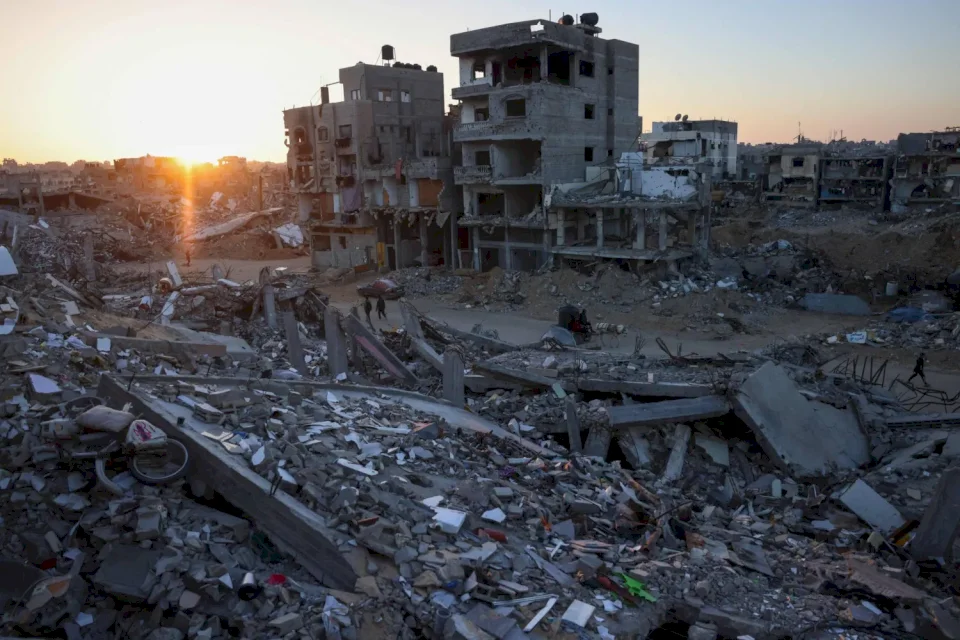
Trump's Plan for Gaza on the Line: Secret Documents Reveal Fragility of the Ceasefire
SadaNews - Secret documents obtained by the U.S. newspaper "Politico" reveal a grim picture of the challenges facing U.S. President Donald Trump's plan to end the war in Gaza, particularly regarding the deployment of a multinational international security force to maintain stability.
The documents indicate that officials in the Trump administration expressed deep concerns about the potential collapse of the agreement between Israel and Hamas, due to the difficulty in implementing its key provisions and the ambiguity surrounding its application. These documents were presented during a closed two-day seminar last month, which brought together leaders from the U.S. Central Command and members of the Civil-Military Coordination Center in southern Israel, as part of the ceasefire agreement that took effect on October 10.
The seminar, called by the U.S. security coordinator for the Palestinian Authority and Israel, Michael Fenzel, was attended by about 400 participants from the State and Defense Departments, along with representatives from NGOs and private companies. It highlighted growing concerns regarding the feasibility of deploying the "International Stabilization Force," a multinational security initiative aimed at maintaining peace in Gaza, amid doubts about its viability and potential for implementation.
One official from the U.S. Department of Defense described the situation as "worrisome," pointing out that there are "suppressed concerns" within the administration about the future of the region. These concerns contrast with the optimistic rhetoric promoted by senior officials in the U.S. administration.
The documents highlight a series of obstacles hindering the transition from a ceasefire to a lasting peace plan, including weak coordination between the Defense and State Departments, Israel's hesitance to withdraw from Gaza, Hamas's continued violations of the truce, in addition to the difficulty of forming governance institutions such as a "Peace Council" that is supposed to oversee the implementation of the plan.
U.S. diplomat David Shincker, who served as Assistant Secretary of State for Middle Eastern Affairs in Trump's first administration, noted that the administration is suffering from a lack of dedicated personnel for this file, saying: "Gaza alone deserved a full-time dedicated team, but the administration treated it as a secondary issue."
The documents also warn that Hamas has already begun to fill the security vacuum in Gaza, having redeployed about 7,000 security personnel in the areas it controls, while Israel continues to control 53% of the territory, while 95% of the population lives in the remaining 47%.
On the other hand, relief efforts face logistical challenges, as the number of aid trucks entering Gaza daily does not exceed 600, a figure insufficient to meet the growing needs.
The documents also indicate that "any delay in implementing the plan benefits Hamas," which is exploiting time to re-establish its control through various means, from propaganda to proxy attacks.
As for the "International Stabilization Force," which is supposed to be coordinated by the United States, it faces fundamental questions regarding its legal mandate, rules of engagement, formation mechanism, and area of operations. Several countries have expressed a willingness to contribute funding or resources but have stipulated the issuance of a mandate from the United Nations Security Council.
While Washington plans to hold an international donors' conference following a resolution from the Security Council, the timeline for this conference remains unclear, amid doubts about the commitment of countries to provide human forces, not just financial support.
The documents also reveal ongoing disputes between Israel and the Palestinian Authority regarding who will take final responsibility for Gaza, given the Authority's desire to play a larger role and Israel's opposition to this.

High-level sources reveal to SadaNews: Washington seeks to hold a Gaza Reconstruction Conf...

Sources to 'SadaNews': 'Hamas' Prepares to Announce New Head of Its Political Bureau

The Largest Since the Iraq Invasion: Washington Continues to Strengthen Its Military Prese...

Americans Ask: Does Huckabee Represent Washington's Interests or Those of Tel Aviv?

Global Newspapers: Sewage Crisis on American Aircraft Carrier and Its Sailors Want to Resi...

مصر وتركيا.. "التحالف الإسلامي" الذي تخشاه إسرائيل

Sheikh Sends Message to Mladenov Announcing the Establishment of a Liaison Office Headed b...

